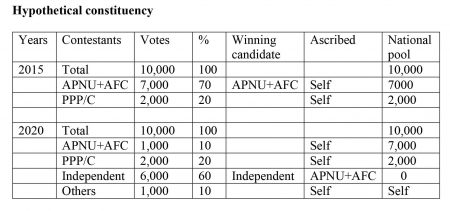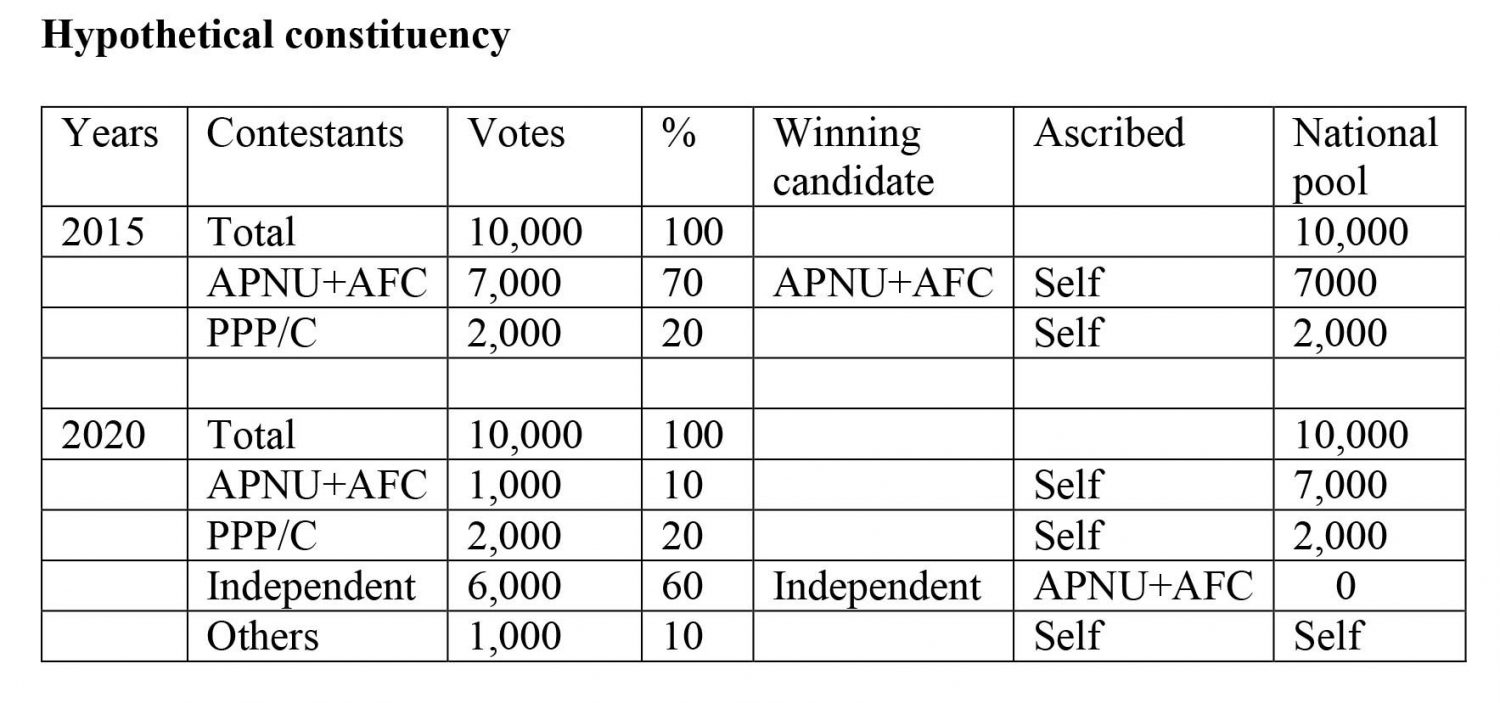
Many have noted that what was proposed last week would be achieved in a fashion that would leave us with a weak and at times non-existent opposition. We have been taught to perceive of political opposition mainly as expressed by the Westminster model, i.e. located in the competitive environment of parliament. While this may work adequately in a homogeneous political system, it does not work for us, particularly in the constitutional arrangement we have created for ourselves. The truth is that an opposition can exist at many points in the system, and my proposed presidential system has to some degree taken it right into the executive. In any case, I believe that the absence of an opposition in 2015 in the example given last week came about because we needed to find a way to remove the PPP/C after more than two decades in office but that the system will normalize to there being a regular but still small opposition. A small opposition, especially if vibrant, can do the job, for we have severely weakened the autocratic possibilities of the presidency and that job is not completed. At another time we will focus on that other level of autocratic power; the oligarchies that control political parties.
There is a near universal demand for constitutional reform to produce MPs who are directly responsible and accountable to their constituents. I will now consider the legislature and seek to enhance the independence of MPs in a manner that could be disruptive to the traditional political leaderships. However, it is important to understand that success will depend upon not suggesting changes that threaten and unequally endanger the traditional political bases of the parties.
The proposal
There shall be a parliament of 65 members, 55 of whom will be elected in single member constituencies based upon a transferable vote proportional system. The remaining 10 seats will be used for top up in order to bring the results in line with national proportionality.
Except for the first 3 persons who will be its presidential candidates, there will be an open list system in which each party states its parliamentarians. Parties may participate in one or all constituencies, but an individual is allowed to participate in only one and may ascribe his/her votes to the national pool of any party.
All MPs will be legally elected in their own names and those representing parties may also carry their party symbol on the ballot. On a petition of 500 constituents a MP can be recalled if the proposers gain more than 50% of the votes cast in a referendum to recall.
Important comments
During the 2016 local government elections, the contesting independent groups and individuals did extremely badly against the traditional political parties. However, in the PNC stronghold of the Beterverwagting/Triumph Neighbourhood Democratic Council (BV/T NDC), the APNU+AFC, fearful of the outcome left the field to a local independent group, the 8th of May Movement (8MM), who won the day. I argued then that what appeared to have happened was that ‘the coming to government of a coalition led by the PNC has reduced that (ethnic political) fear among Africans, and this, coupled with a context in which supporting the PNC or 8MM presented no risk of Indian ethnic dominance, is indicative of the willingness of citizens to migrate from the traditional parties when ethnic voting has little or no value. It is perhaps also suggestive of how we should seek to organise our constituencies in future electoral reform (Beterverwagting: a better expectation. SN: 18/06/2016).
Our constitution states that ‘Parliament may make provision for the division of Guyana into such number of geographical constituencies, not being more than half the number of the elected members of the Assembly as Parliament may prescribe.’ At present there are 25 constituency representatives, but the traditional parties make the decision about who they will be, where they will be placed, etc. and few people are aware that there are constituency representatives. Even if, as suggested, the system is changed to establish, say 55 MPs who are theoretically directly elected and accountable to their constituencies, the traditional parties will find covert ways of controlling the situation even if there are laws banning their participation at the local level. What is required are rules that create the kind of environment that existed in the BV/T NDC, where the fear of ethnic loss, particularly at the national level, as a result of local politicking is severely reduced.
It appears to me that ascription will allow voters to choose a non-party representative whom they believe will best serve their local interest but yet not meaningfully affect the overall electoral fortunes of their party at the national level. The following table gives an idea of what the position would have been in the 2015 elections and would be under the proposed system.
Hypothetical constituency

Of course, there is still the problem that an Independent member may not want to follow the party line and while some may consider this a good thing, it could be problematical where there is a small parliament majority and if we want the suggested changes to be acceptable to the existing parties. Therefore, to give both the parties and constituents greater security, the recall arrangement, which is useful in itself, is established at the relatively low level of 50%. This will be a bit more time consuming to implement but will mean that if the MP antagonises both the party’s leadership and her/his constituent, s/he will be recalled. I believe that this is much more transparent than the pre-emptive resignations many MPs were made to sign or the rules which prevent them from crossing the floor.
Conclusion
We need to know what our problems are, what we want to accomplish and something of the path that will take us to our goal. This is the purpose of the very broad framework being presented here and the national consultation which will accompany the constitutional reform process. I also agree with those who argue that constitution-making must rely heavily upon real experts to identify pitfalls and suggest appropriate alternatives. However, experts tend to arrive with their ideological baggage and I also think that in these kinds of endeavours we are hamstrung only by our own imagination.






